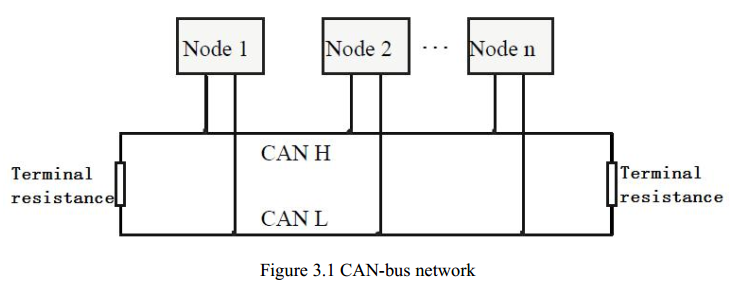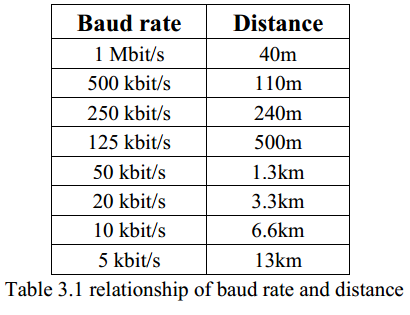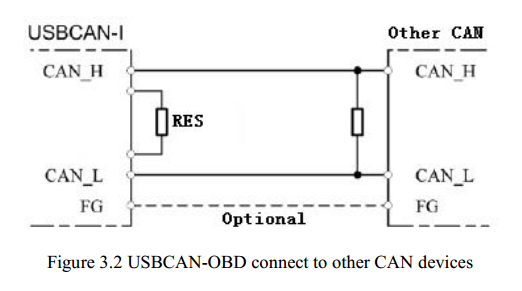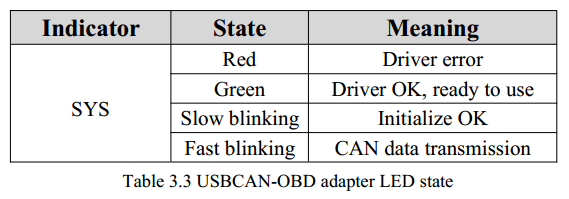Use Of The USBCAN-OBD_GCAN
3 Adapter in use
3.1 Connect to USB
USBCAN-OBD adapter can compatibility to the USB2.0 full speed protocol specification, compatible USB1.1 and USB3.0.
When driver and software have been installed, connect the adapter to the USB interface, a new USBCAN device named "GC - Tech USBCAN Device" can be found in the PC Device manager. If there is no "!" or "?" mark that the device run fine.
3.2 Connect to CAN
USBCAN-OBD adapter connect to CAN-Bus as chapter 2.3, CAN_H to CAN_H, CAN_L to CAN_L.
The CAN bus network adopts topological structure, only the two furthest terminal need to connect 120Ω terminal resistance between CAN_H and CAN_L. For branch connection, its length should not be more than 3m. CAN-bus nodes connection as
shown in figure 3.1

Note: the CAN-bus cable can use twisted-pair cable, shielded twisted-pair cable. Theory of the maximum communication distance depends on the bus baud rate, Their relationship as shown in the Table 3.1.

3.3 CAN-Bus terminal resistance
In order to improve the communication reliability and eliminating CAN-bus terminal reflection, the two furthest terminal need to connect terminal resistance between CAN_H and CAN_L as shown in figure 3.2. Terminal resistance values determined by the characteristic impedance of the cables. Such as, the characteristic impedance is 120Ω.

Note: USBCAN-OBD adapter has integrated one 120Ω terminal resistance, users can choose whether enable.
3.4 System LED
USBCAN-OBD adapter with one bi-colour PWR indicator to indicate the adapter status. More functions are shown in table 3.2 and 3.3

When USBCAN-OBD adapter power on, the indicator will light, indicates the adapter has power supply, the system is initialized; Otherwise, a system power failure or system errors has exist.
When CAN-Bus data transceiver, the indicator will blinking.

3.1 Connect to USB
USBCAN-OBD adapter can compatibility to the USB2.0 full speed protocol specification, compatible USB1.1 and USB3.0.
When driver and software have been installed, connect the adapter to the USB interface, a new USBCAN device named "GC - Tech USBCAN Device" can be found in the PC Device manager. If there is no "!" or "?" mark that the device run fine.
3.2 Connect to CAN
USBCAN-OBD adapter connect to CAN-Bus as chapter 2.3, CAN_H to CAN_H, CAN_L to CAN_L.
The CAN bus network adopts topological structure, only the two furthest terminal need to connect 120Ω terminal resistance between CAN_H and CAN_L. For branch connection, its length should not be more than 3m. CAN-bus nodes connection as
shown in figure 3.1

Note: the CAN-bus cable can use twisted-pair cable, shielded twisted-pair cable. Theory of the maximum communication distance depends on the bus baud rate, Their relationship as shown in the Table 3.1.

3.3 CAN-Bus terminal resistance
In order to improve the communication reliability and eliminating CAN-bus terminal reflection, the two furthest terminal need to connect terminal resistance between CAN_H and CAN_L as shown in figure 3.2. Terminal resistance values determined by the characteristic impedance of the cables. Such as, the characteristic impedance is 120Ω.

Note: USBCAN-OBD adapter has integrated one 120Ω terminal resistance, users can choose whether enable.
3.4 System LED
USBCAN-OBD adapter with one bi-colour PWR indicator to indicate the adapter status. More functions are shown in table 3.2 and 3.3

When USBCAN-OBD adapter power on, the indicator will light, indicates the adapter has power supply, the system is initialized; Otherwise, a system power failure or system errors has exist.
When CAN-Bus data transceiver, the indicator will blinking.



